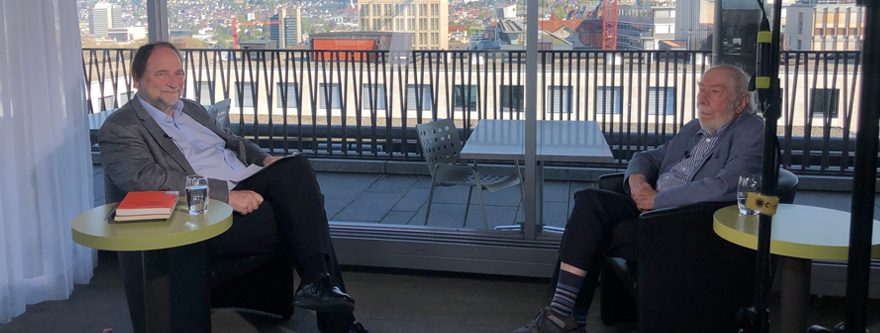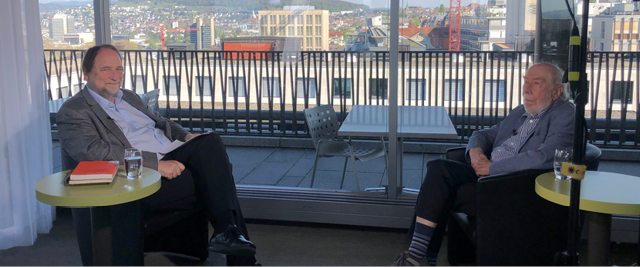|
|
|
|
|
|
|
| In memory of Niklaus Wirth |
Dear readers,
The death of Niklaus Wirth on 1 January touched many of us. We have lost a valued colleague, a friend, a role model and a historical figure. Niklaus Wirth not only helped to shape our department, but also the early history of computer science.
In this special newsletter, we take a journey through time and look back at some of his significant achievements. We link to interesting articles and interviews and let a few former companions pay tribute.
We hope you enjoy reading.
Best regards,

Kenny Paterson
Department Head
Read the full ETH farewell article here.
|
|
|
|
|
|
|
|
|
|
|
|
| Timeline |
| Turing Award winner, computer pioneer, inventor of influential programming languages: Niklaus Wirth’s achievements and accomplishments in the field of computer science are far-reaching. Browse through the timeline below and gain insight into some of Niklaus Wirth’s research and professional milestones. |
|
|
|
|
|
|
|
|
| "There were only three professors and half a dozen assistants. Nothing like today." |
| Heinz Rutishauser, Peter Läuchli and Niklaus Wirth establish the Group for Computer Science, with Carl August Zehnder joining them in 1970. After Rutishauser passed away in 1970, the group was renamed the Institute for Computer Science. |
|
|
|
|
|
|
|
|
|
|
| On Programming |
"Programming, from its birth, has been regarded as a child of the lowest caste, which no mathematician with minimal self-esteem deals with. This is due to the fact that computers have always been very focused on the technologies available and are extremely expensive devices in which no effort is spared in their construction in order to achieve the desired effects with a minimum of components. As a consequence of these purely economic circumstances, monsters arose with extremely inconsistent structural principles and a set of command rules with at least as many exceptions that it was hardly possible to arouse the interest of a systematic scientist. The intricate programming of these machines mainly attracted people with a penchant for puzzles, brain teasers, and sorcery."
Niklaus Wirth at the inaugural lecture on 14 December 1968 |
|
|
|
|
|
|
|
|
| "A designer of programming languages is someone who collects ideas and understands how to mold them into a whole." |
| Niklaus Wirth develops the programming language Pascal, a successor to Algol, which would become widely popular. At ETH and numerous other universities, Pascal was used in education for many years. The success of this programming language brought international recognition to computer science research at ETH Zurich. |
|
|
|
|
|
|
|
|
|
|
|
|
| "We built Lilith with the aid of a colleague in the US. We did a demo and all the people were very enthusiastic. But the response came two or three years later and that was a little too late." |
Niklaus Wirth and Richard Ohran develop the personal computer Lilith, based on the Xerox Alto, featuring a high-resolution graphical display and a mouse. Lilith was put into operation about five years before the first Macintosh and was used at ETH Zurich until 1990. Lilith strongly influenced the research activities of the ensuing years and can be regarded as the nucleus of computer science research at ETH Zurich during the 1980s.
Image: Leo Geissmann wrote the 4-pass Modula-2 compiler which generated the M-Code that executed on the Lilith. |
|
|
|
|
|
|
|
|
|
|
|
|
| "We forget today just how much effort it took to put computer science on the map back then." |
Niklaus Wirth, Carl August Zehnder, Jürg Nievergelt and Peter Läuchli found the Division of Computer Science (IIIC), laying the foundation for today’s D-INFK. This is the first time that a new division is created at ETH Zurich since 1935, when electrical engineering was introduced. A little more than a hundred students begin studying in the new graduate course “Computer Science Engineer”.
Image (from left): Rul Gunzenhäuser, Carl August Zehnder, a guest and Urs Hochstrasser attend the presentation of the new division in Audi Max. |
|
|
|
|
|
|
|
|
|
|
|
|
| "The big consequence of the Turing Award only came later. I was invited to give lecture tours in Russia and China. I took up those invitations in the 90s and 2000s after I retired." |
| Niklaus Wirth wins the ACM Turing Award for developing a sequence of innovative computer languages: Euler, Algol-W, Modula and Pascal. Pascal has become pedagogically significant and has provided a foundation for future computer language, systems, and architectural research. Niklaus Wirth was the first and so far only German-speaking computer scientist, who ever received this prestigious award. |
|
|
|
|
|
|
|
|
|
|
|
|
| "All my life, I have aimed to develop a language that is as powerful as possible but as simple as possible too. Oberon is the final link in that development chain." |
| Niklaus Wirth and Jürg Gutknecht introduce the programming language and operating system Oberon. Oberon subsequently became the standard language for programming courses at ETH Zurich, where it remained into the new century. |
|
|
|
|
|
|
|
|
|
|
|
|
| The Assignment Dilemma |
by Friedemann Mattern, Professor Emeritus D-INFK
We all know that beginning programmers often have difficulties understanding something as "simple" as the assignment statement. In 2005, Niklaus Wirth criticized the design decision to use the equals sign "=" as an assignment operator in many popular programming languages (such as Java, C, Basic, or Fortran) with harsh words:
"A notorious example for a bad idea was the choice of the equal sign to denote assignment. [...] Why is it a bad idea? Because it overthrows a century old tradition to let '=' denote a comparison for equality, a predicate which is either true or false. But Fortran made it to mean assignment, the enforcing of equality. In this case, the operands are on unequal footing: The left operand (a variable) is to be made equal to the right operand (an expression). x = y does not mean the same thing as y = x. [...] Perhaps this may appear as nitpicking to programmers who got used to the equal sign meaning assignment. But mixing up assignment and comparison is a truly bad idea, because it requires that another symbol be used for what traditionally was expressed by the equal sign."
Algol, and the Wirth languages Pascal, Modula, Oberon – but also, for example, Smalltalk and Eiffel – use the assigment operator ":=" instead. |
|
|
|
|
|
|
|
|
|
|
| "Programmes must not be regarded as code for computers, but literature for humans." |
| In 2014, a birthday symposium is held at ETH Zurich to celebrate Niklaus Wirth's 80th birthday. During the symposium, D-INFK together with international guests, students and close friends celebrate Niklaus Wirth's life and work. His contributions to programming languages, methodology, software engineering, and design of personal workstations are presented and discussed. |
|
|
|
|
|
|
|
|
|
|
|
|
| "People weren't against computers per se. They just said that programming is something an engineer learns on the side and not an academic discipline." |
On October 12 2021, a small get-together is held in the CAB building in honour of D-INFK founders Niklaus Wirth and Carl August Zehnder. In a discussion panel, the department founders recount how they, together with Peter Läuchli and Jürg Nievergelt, launched the computer science curriculum at ETH Zurich 40 years ago. Read more about the reunion here.
Image (from left): Ueli Maurer, Carl August Zehnder, Niklaus Wirth and Timothy Roscoe. |
|
|
|
|
|
|
|
|
|
|
| Video series – a conversation between Niklaus Wirth and Friedemann Mattern |
 |
 |
| As part of the 40th anniversary celebrations of our department in 2021, Prof. em. Niklaus Wirth sat down with Prof. em. Friedemann Mattern, to talk about his career path, his research milestones and his personal life. The result was three rich videos, where we get to know a person who was not only a researcher, but also a dedicated teacher who wanted to make computer science accessible to society. |
|
|
|
|
|
|
|
|
|
|
"I always saw myself as an engineer"
|
|
|
|
In 1970, Niklaus Wirth developed the programming language Pascal and became world famous with it. In this conversation, he talks about the beginnings of computer science and how he influenced them significantly. Read the spotlight here. |
|
|
|
| |
|
|
|
|
"Switzerland had slept through it"
|
|
|
|
In this continuing conversation, Niklaus Wirth talks about the hurdles he had to overcome when introducing computer science to Switzerland and why the label "made in the USA" was absolutely necessary at the time. Read the spotlight here. |
|
|
|
| |
|
|
|
|
"You can't invent everything perfectly from the start"
|
|
|
| In the last part of this video series, Niklaus Wirth tells us what doors the prestigious Turing Award opened for him, allowing him to advance his research, and how he got one step closer to perfection with each programming language. Read the spotlight here. |
|
|
|
|
|
| |
| |
|
|
|
|
|
|
|
|
| From the archives |
| Step into the past with 'From the archives' as we unveil exclusive contributions from newspaper articles and TV programmes on the topic of computer science development. Delve into the groundbreaking research highlights shaped by Professor Niklaus Wirth's visionary involvement. |
|
|
|
|
60 tons of computing power
|
|
|
| SRF's Antenne reports on the installation of ETH Zurich's new supercomputers, CDC 6400 and CDC 6500, in 1970. The two mainframe computers became even more useful when Niklaus Wirth and his co-workers developed the multi-access system VENUS, which allowed to execute small calculations on the supercomputer without interfering with the larger jobs. |
|
|
|
| |
|
|
|
|
When computers were still explainable
|
|
|
| Since computer science was introduced at ETH Zurich in 1968, computers have become smaller but also more complex. Understanding them is becoming increasingly difficult. Niklaus Wirth takes up this topic for local newspaper NZZ in 2008. In his article, he laments the widening gap between experts and the public, posing a threat to society. |
|
|
|
| |
|
|
|
|
150 years ETH Zurich: Computer history
|
|
|
| In celebration of the 150th anniversary of ETH Zurich, a special segment titled "Menschen Technik Wissenschaft" delves into the rich tapestry of our university's computer history. In this video, Niklaus Wirth shares insights into the world of Lilith and reflects on the potential and missed opportunities in software development within the Swiss landscape. |
|
|
|
|
|
| |
| |
|
|
|
|
|
|
|
|
| In memory of a remarkable scientist, colleague and friend |
 |
 |
"Whereas Europeans generally pronounce my name the right way ("Ni-klows Wirt"), Americans invariably mangle it into "Nick-les Worth". This is to say that Europeans call me by name, but Americans call me by value."
- Niklaus Wirth |
|
|
|
|
|
|
|
|
|
|
|
|
| Visionary life: Niklaus Wirth in frames |
Browse through our photo gallery and gain insight into Niklaus Wirth’s rich life. Impressions from work conventions, research inventions and personal events show that Niklaus Wirth was a visionary character, a loving friend and family member, and a driving force in computer science development.
Image: Niklaus Wirth with his daughter Carolyn Wiskemann at the Congress of "Pour le merite" in Ludwigsburg, 2016. |
|
|
|
|
|
|
|
|
|
|
| Niklaus Wirth in the news |
|
|
|
|
|